Juvenile Detention and Repeated Offender Behavior
VerifiedAdded on 2023/01/23
|10
|3024
|82
AI Summary
This essay argues that the process of juvenile detention causes more harm than benefit to children, leading to repeated offending behavior in adulthood. It discusses the negative effects of the detention centers' environment, loss of education, trauma, and youth incarceration.
Contribute Materials
Your contribution can guide someone’s learning journey. Share your
documents today.
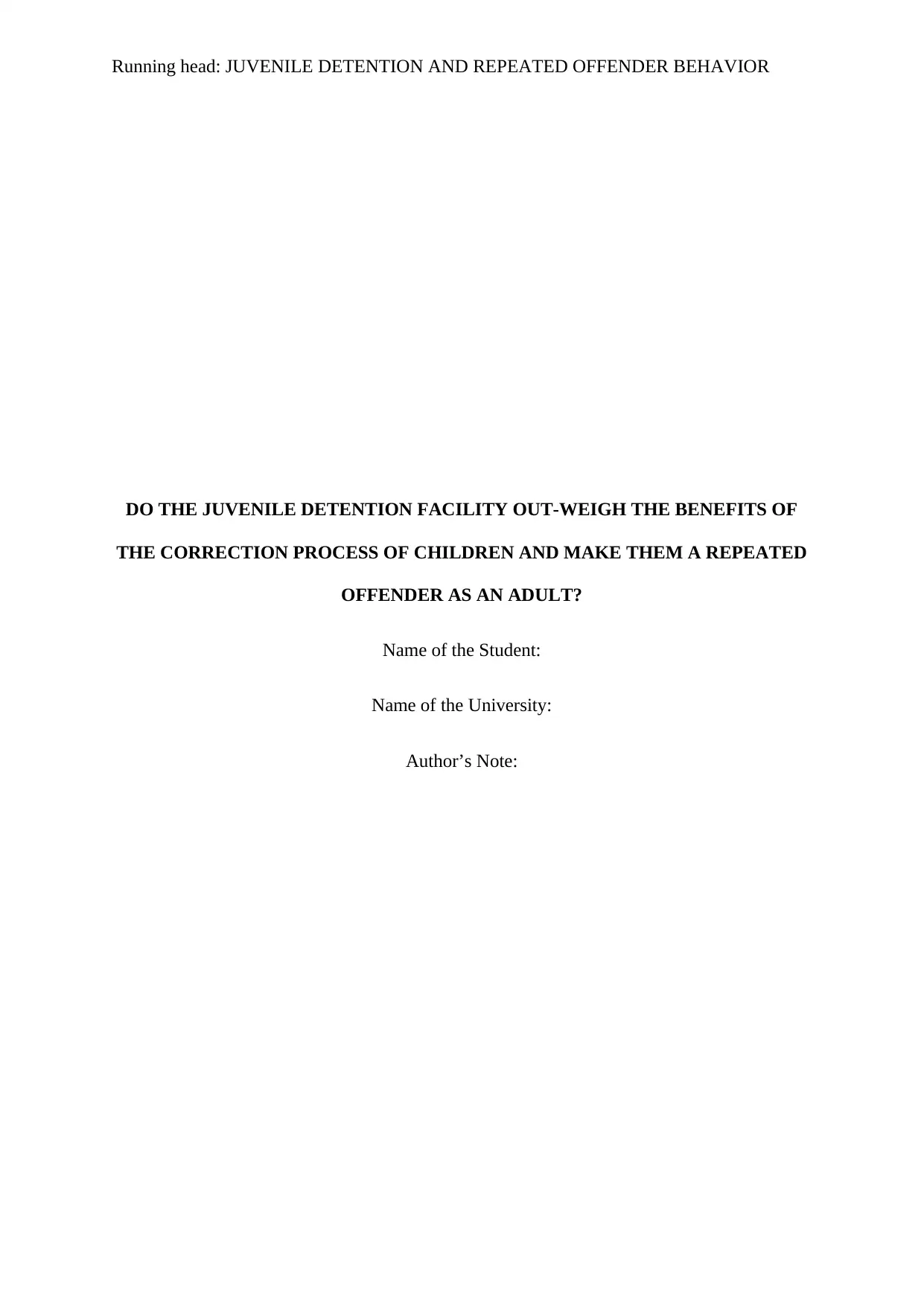
Running head: JUVENILE DETENTION AND REPEATED OFFENDER BEHAVIOR
DO THE JUVENILE DETENTION FACILITY OUT-WEIGH THE BENEFITS OF
THE CORRECTION PROCESS OF CHILDREN AND MAKE THEM A REPEATED
OFFENDER AS AN ADULT?
Name of the Student:
Name of the University:
Author’s Note:
DO THE JUVENILE DETENTION FACILITY OUT-WEIGH THE BENEFITS OF
THE CORRECTION PROCESS OF CHILDREN AND MAKE THEM A REPEATED
OFFENDER AS AN ADULT?
Name of the Student:
Name of the University:
Author’s Note:
Secure Best Marks with AI Grader
Need help grading? Try our AI Grader for instant feedback on your assignments.
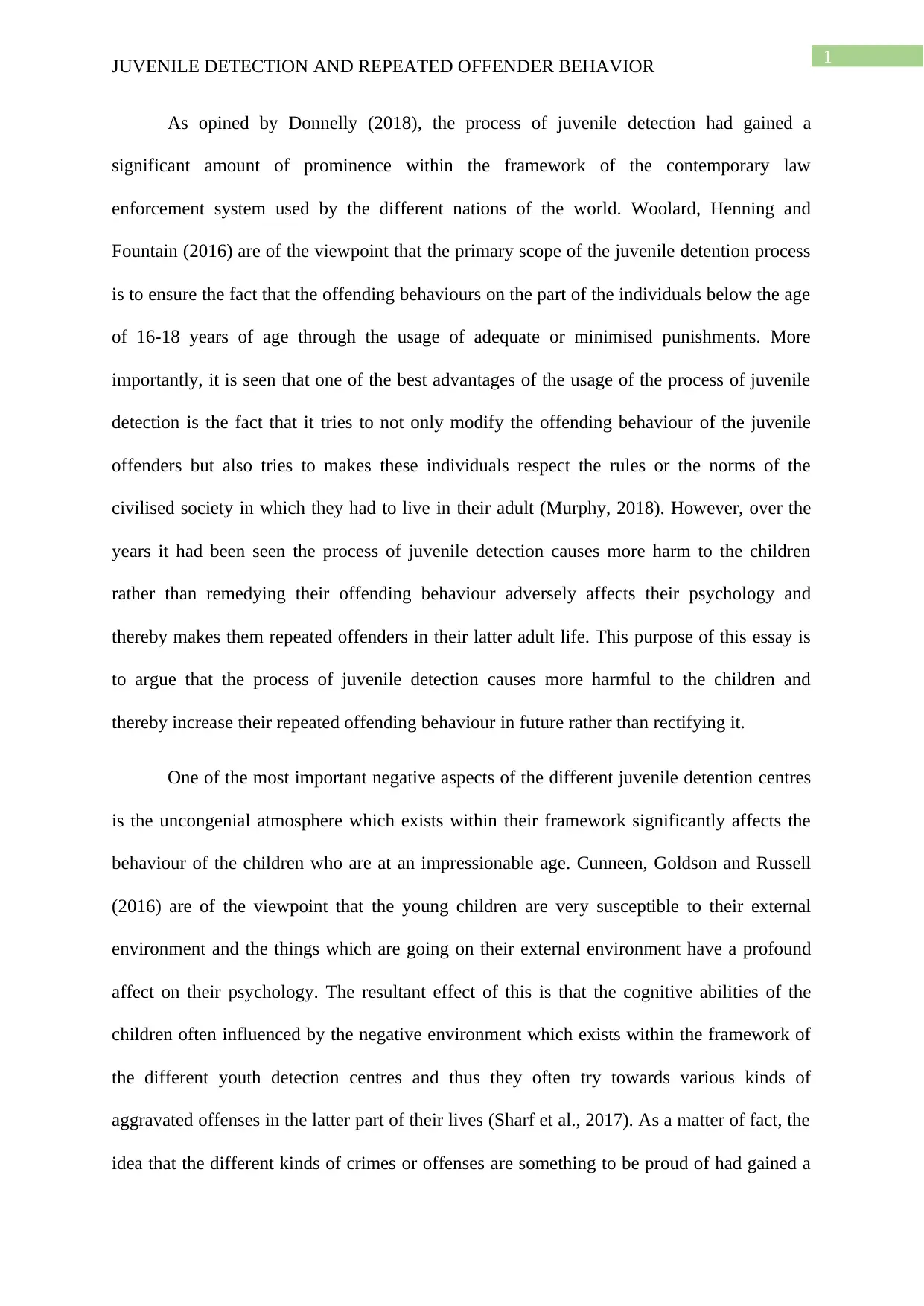
1
JUVENILE DETECTION AND REPEATED OFFENDER BEHAVIOR
As opined by Donnelly (2018), the process of juvenile detection had gained a
significant amount of prominence within the framework of the contemporary law
enforcement system used by the different nations of the world. Woolard, Henning and
Fountain (2016) are of the viewpoint that the primary scope of the juvenile detention process
is to ensure the fact that the offending behaviours on the part of the individuals below the age
of 16-18 years of age through the usage of adequate or minimised punishments. More
importantly, it is seen that one of the best advantages of the usage of the process of juvenile
detection is the fact that it tries to not only modify the offending behaviour of the juvenile
offenders but also tries to makes these individuals respect the rules or the norms of the
civilised society in which they had to live in their adult (Murphy, 2018). However, over the
years it had been seen the process of juvenile detection causes more harm to the children
rather than remedying their offending behaviour adversely affects their psychology and
thereby makes them repeated offenders in their latter adult life. This purpose of this essay is
to argue that the process of juvenile detection causes more harmful to the children and
thereby increase their repeated offending behaviour in future rather than rectifying it.
One of the most important negative aspects of the different juvenile detention centres
is the uncongenial atmosphere which exists within their framework significantly affects the
behaviour of the children who are at an impressionable age. Cunneen, Goldson and Russell
(2016) are of the viewpoint that the young children are very susceptible to their external
environment and the things which are going on their external environment have a profound
affect on their psychology. The resultant effect of this is that the cognitive abilities of the
children often influenced by the negative environment which exists within the framework of
the different youth detection centres and thus they often try towards various kinds of
aggravated offenses in the latter part of their lives (Sharf et al., 2017). As a matter of fact, the
idea that the different kinds of crimes or offenses are something to be proud of had gained a
JUVENILE DETECTION AND REPEATED OFFENDER BEHAVIOR
As opined by Donnelly (2018), the process of juvenile detection had gained a
significant amount of prominence within the framework of the contemporary law
enforcement system used by the different nations of the world. Woolard, Henning and
Fountain (2016) are of the viewpoint that the primary scope of the juvenile detention process
is to ensure the fact that the offending behaviours on the part of the individuals below the age
of 16-18 years of age through the usage of adequate or minimised punishments. More
importantly, it is seen that one of the best advantages of the usage of the process of juvenile
detection is the fact that it tries to not only modify the offending behaviour of the juvenile
offenders but also tries to makes these individuals respect the rules or the norms of the
civilised society in which they had to live in their adult (Murphy, 2018). However, over the
years it had been seen the process of juvenile detection causes more harm to the children
rather than remedying their offending behaviour adversely affects their psychology and
thereby makes them repeated offenders in their latter adult life. This purpose of this essay is
to argue that the process of juvenile detection causes more harmful to the children and
thereby increase their repeated offending behaviour in future rather than rectifying it.
One of the most important negative aspects of the different juvenile detention centres
is the uncongenial atmosphere which exists within their framework significantly affects the
behaviour of the children who are at an impressionable age. Cunneen, Goldson and Russell
(2016) are of the viewpoint that the young children are very susceptible to their external
environment and the things which are going on their external environment have a profound
affect on their psychology. The resultant effect of this is that the cognitive abilities of the
children often influenced by the negative environment which exists within the framework of
the different youth detection centres and thus they often try towards various kinds of
aggravated offenses in the latter part of their lives (Sharf et al., 2017). As a matter of fact, the
idea that the different kinds of crimes or offenses are something to be proud of had gained a
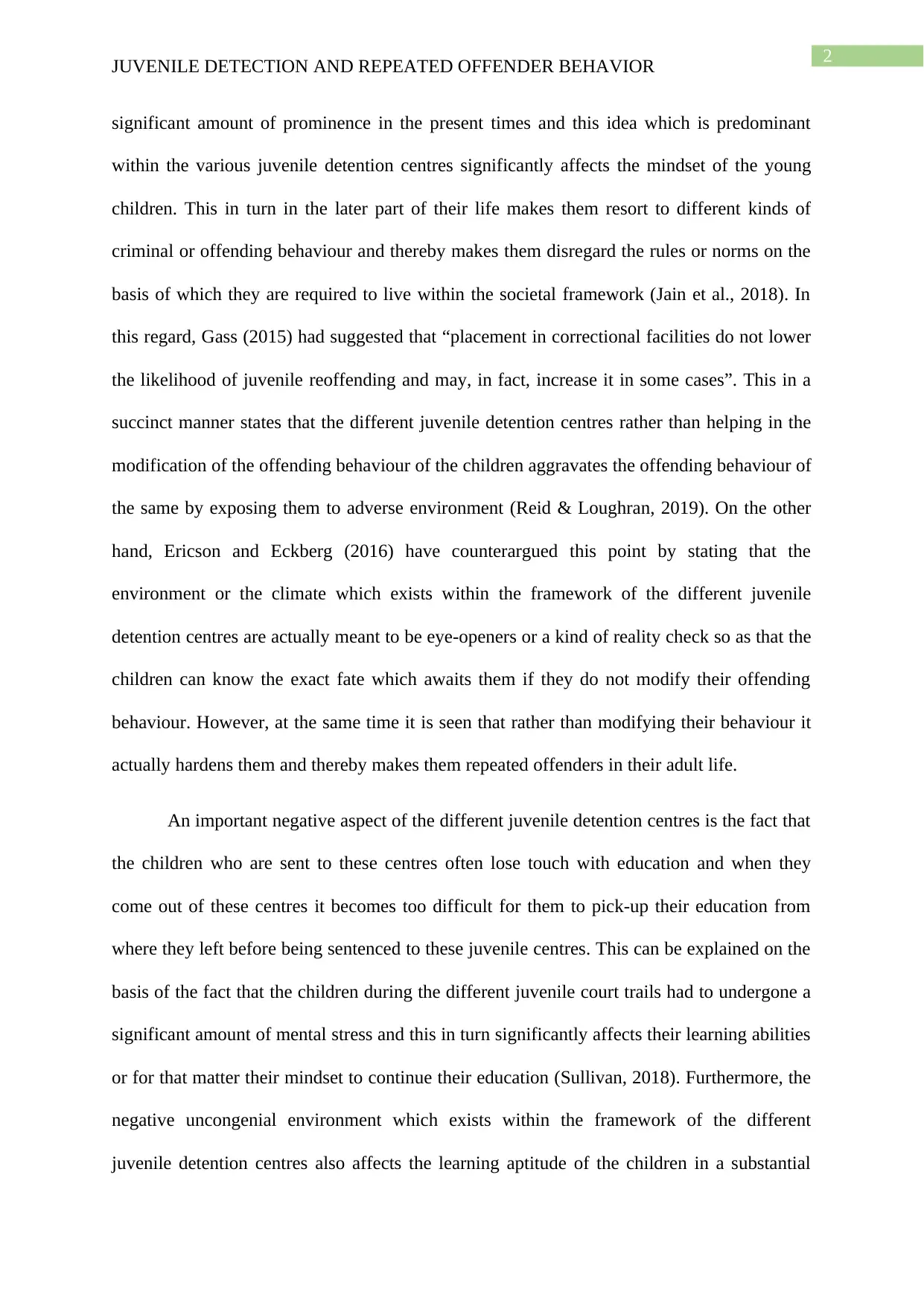
2
JUVENILE DETECTION AND REPEATED OFFENDER BEHAVIOR
significant amount of prominence in the present times and this idea which is predominant
within the various juvenile detention centres significantly affects the mindset of the young
children. This in turn in the later part of their life makes them resort to different kinds of
criminal or offending behaviour and thereby makes them disregard the rules or norms on the
basis of which they are required to live within the societal framework (Jain et al., 2018). In
this regard, Gass (2015) had suggested that “placement in correctional facilities do not lower
the likelihood of juvenile reoffending and may, in fact, increase it in some cases”. This in a
succinct manner states that the different juvenile detention centres rather than helping in the
modification of the offending behaviour of the children aggravates the offending behaviour of
the same by exposing them to adverse environment (Reid & Loughran, 2019). On the other
hand, Ericson and Eckberg (2016) have counterargued this point by stating that the
environment or the climate which exists within the framework of the different juvenile
detention centres are actually meant to be eye-openers or a kind of reality check so as that the
children can know the exact fate which awaits them if they do not modify their offending
behaviour. However, at the same time it is seen that rather than modifying their behaviour it
actually hardens them and thereby makes them repeated offenders in their adult life.
An important negative aspect of the different juvenile detention centres is the fact that
the children who are sent to these centres often lose touch with education and when they
come out of these centres it becomes too difficult for them to pick-up their education from
where they left before being sentenced to these juvenile centres. This can be explained on the
basis of the fact that the children during the different juvenile court trails had to undergone a
significant amount of mental stress and this in turn significantly affects their learning abilities
or for that matter their mindset to continue their education (Sullivan, 2018). Furthermore, the
negative uncongenial environment which exists within the framework of the different
juvenile detention centres also affects the learning aptitude of the children in a substantial
JUVENILE DETECTION AND REPEATED OFFENDER BEHAVIOR
significant amount of prominence in the present times and this idea which is predominant
within the various juvenile detention centres significantly affects the mindset of the young
children. This in turn in the later part of their life makes them resort to different kinds of
criminal or offending behaviour and thereby makes them disregard the rules or norms on the
basis of which they are required to live within the societal framework (Jain et al., 2018). In
this regard, Gass (2015) had suggested that “placement in correctional facilities do not lower
the likelihood of juvenile reoffending and may, in fact, increase it in some cases”. This in a
succinct manner states that the different juvenile detention centres rather than helping in the
modification of the offending behaviour of the children aggravates the offending behaviour of
the same by exposing them to adverse environment (Reid & Loughran, 2019). On the other
hand, Ericson and Eckberg (2016) have counterargued this point by stating that the
environment or the climate which exists within the framework of the different juvenile
detention centres are actually meant to be eye-openers or a kind of reality check so as that the
children can know the exact fate which awaits them if they do not modify their offending
behaviour. However, at the same time it is seen that rather than modifying their behaviour it
actually hardens them and thereby makes them repeated offenders in their adult life.
An important negative aspect of the different juvenile detention centres is the fact that
the children who are sent to these centres often lose touch with education and when they
come out of these centres it becomes too difficult for them to pick-up their education from
where they left before being sentenced to these juvenile centres. This can be explained on the
basis of the fact that the children during the different juvenile court trails had to undergone a
significant amount of mental stress and this in turn significantly affects their learning abilities
or for that matter their mindset to continue their education (Sullivan, 2018). Furthermore, the
negative uncongenial environment which exists within the framework of the different
juvenile detention centres also affects the learning aptitude of the children in a substantial
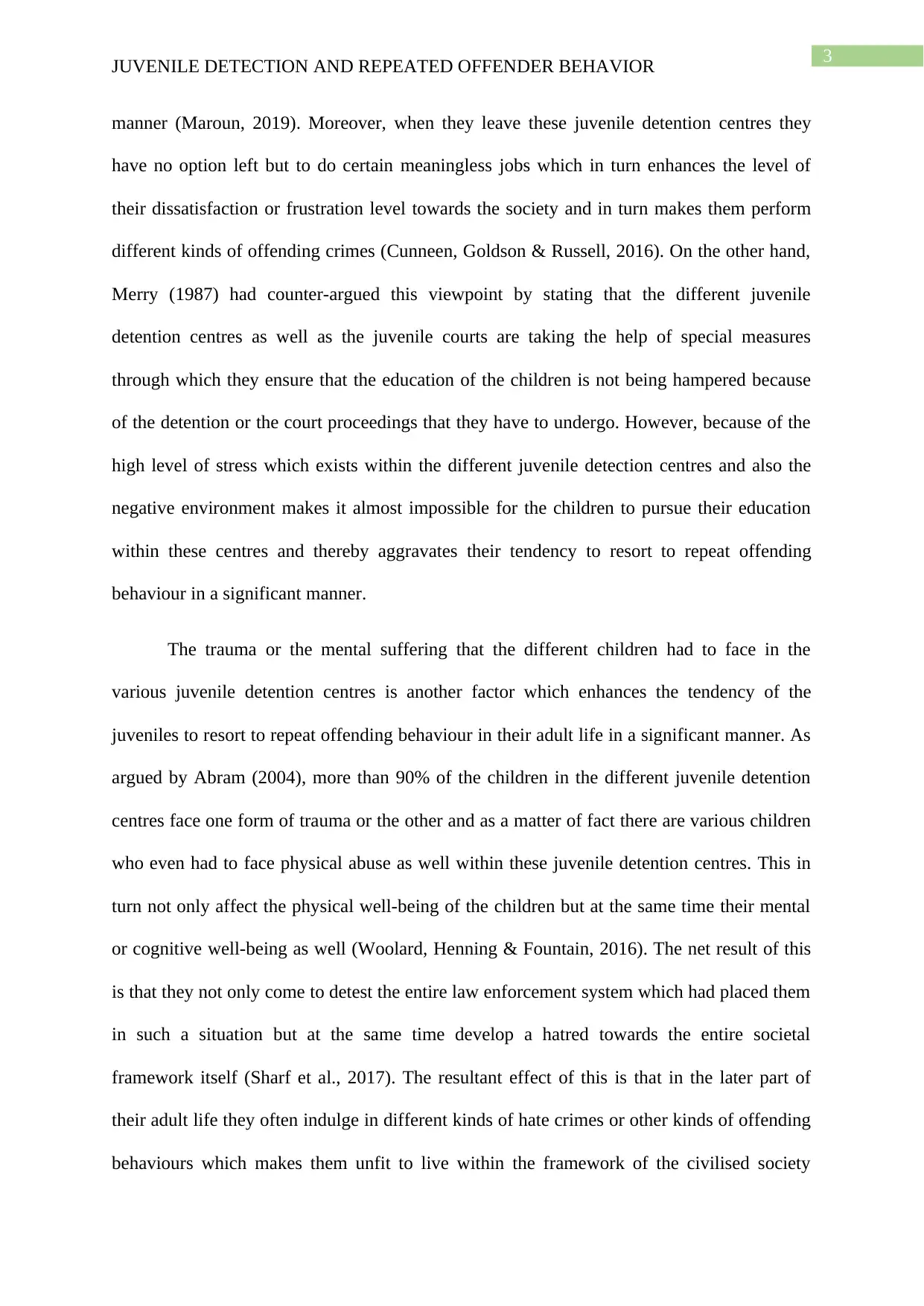
3
JUVENILE DETECTION AND REPEATED OFFENDER BEHAVIOR
manner (Maroun, 2019). Moreover, when they leave these juvenile detention centres they
have no option left but to do certain meaningless jobs which in turn enhances the level of
their dissatisfaction or frustration level towards the society and in turn makes them perform
different kinds of offending crimes (Cunneen, Goldson & Russell, 2016). On the other hand,
Merry (1987) had counter-argued this viewpoint by stating that the different juvenile
detention centres as well as the juvenile courts are taking the help of special measures
through which they ensure that the education of the children is not being hampered because
of the detention or the court proceedings that they have to undergo. However, because of the
high level of stress which exists within the different juvenile detection centres and also the
negative environment makes it almost impossible for the children to pursue their education
within these centres and thereby aggravates their tendency to resort to repeat offending
behaviour in a significant manner.
The trauma or the mental suffering that the different children had to face in the
various juvenile detention centres is another factor which enhances the tendency of the
juveniles to resort to repeat offending behaviour in their adult life in a significant manner. As
argued by Abram (2004), more than 90% of the children in the different juvenile detention
centres face one form of trauma or the other and as a matter of fact there are various children
who even had to face physical abuse as well within these juvenile detention centres. This in
turn not only affect the physical well-being of the children but at the same time their mental
or cognitive well-being as well (Woolard, Henning & Fountain, 2016). The net result of this
is that they not only come to detest the entire law enforcement system which had placed them
in such a situation but at the same time develop a hatred towards the entire societal
framework itself (Sharf et al., 2017). The resultant effect of this is that in the later part of
their adult life they often indulge in different kinds of hate crimes or other kinds of offending
behaviours which makes them unfit to live within the framework of the civilised society
JUVENILE DETECTION AND REPEATED OFFENDER BEHAVIOR
manner (Maroun, 2019). Moreover, when they leave these juvenile detention centres they
have no option left but to do certain meaningless jobs which in turn enhances the level of
their dissatisfaction or frustration level towards the society and in turn makes them perform
different kinds of offending crimes (Cunneen, Goldson & Russell, 2016). On the other hand,
Merry (1987) had counter-argued this viewpoint by stating that the different juvenile
detention centres as well as the juvenile courts are taking the help of special measures
through which they ensure that the education of the children is not being hampered because
of the detention or the court proceedings that they have to undergo. However, because of the
high level of stress which exists within the different juvenile detection centres and also the
negative environment makes it almost impossible for the children to pursue their education
within these centres and thereby aggravates their tendency to resort to repeat offending
behaviour in a significant manner.
The trauma or the mental suffering that the different children had to face in the
various juvenile detention centres is another factor which enhances the tendency of the
juveniles to resort to repeat offending behaviour in their adult life in a significant manner. As
argued by Abram (2004), more than 90% of the children in the different juvenile detention
centres face one form of trauma or the other and as a matter of fact there are various children
who even had to face physical abuse as well within these juvenile detention centres. This in
turn not only affect the physical well-being of the children but at the same time their mental
or cognitive well-being as well (Woolard, Henning & Fountain, 2016). The net result of this
is that they not only come to detest the entire law enforcement system which had placed them
in such a situation but at the same time develop a hatred towards the entire societal
framework itself (Sharf et al., 2017). The resultant effect of this is that in the later part of
their adult life they often indulge in different kinds of hate crimes or other kinds of offending
behaviours which makes them unfit to live within the framework of the civilised society
Secure Best Marks with AI Grader
Need help grading? Try our AI Grader for instant feedback on your assignments.
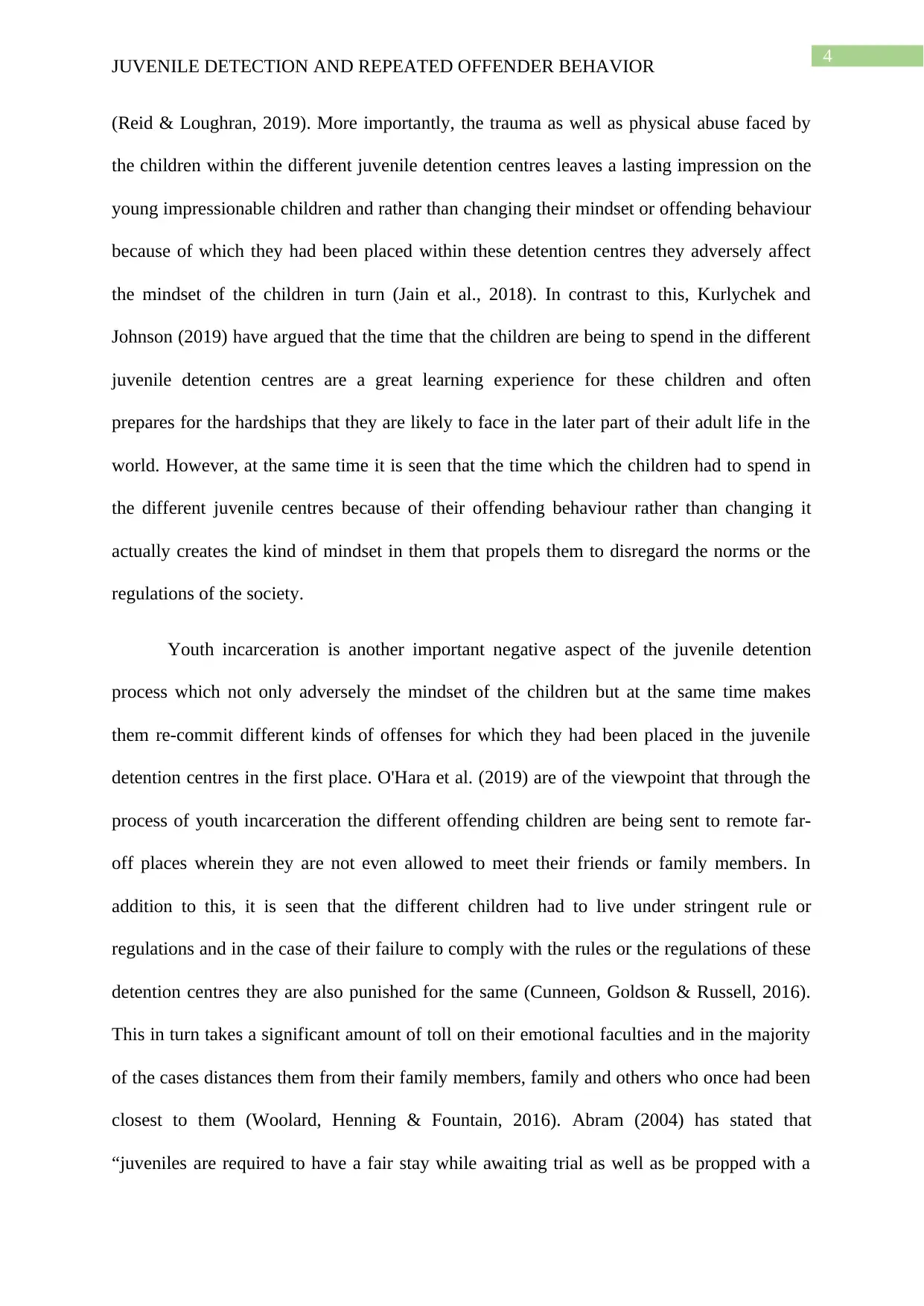
4
JUVENILE DETECTION AND REPEATED OFFENDER BEHAVIOR
(Reid & Loughran, 2019). More importantly, the trauma as well as physical abuse faced by
the children within the different juvenile detention centres leaves a lasting impression on the
young impressionable children and rather than changing their mindset or offending behaviour
because of which they had been placed within these detention centres they adversely affect
the mindset of the children in turn (Jain et al., 2018). In contrast to this, Kurlychek and
Johnson (2019) have argued that the time that the children are being to spend in the different
juvenile detention centres are a great learning experience for these children and often
prepares for the hardships that they are likely to face in the later part of their adult life in the
world. However, at the same time it is seen that the time which the children had to spend in
the different juvenile centres because of their offending behaviour rather than changing it
actually creates the kind of mindset in them that propels them to disregard the norms or the
regulations of the society.
Youth incarceration is another important negative aspect of the juvenile detention
process which not only adversely the mindset of the children but at the same time makes
them re-commit different kinds of offenses for which they had been placed in the juvenile
detention centres in the first place. O'Hara et al. (2019) are of the viewpoint that through the
process of youth incarceration the different offending children are being sent to remote far-
off places wherein they are not even allowed to meet their friends or family members. In
addition to this, it is seen that the different children had to live under stringent rule or
regulations and in the case of their failure to comply with the rules or the regulations of these
detention centres they are also punished for the same (Cunneen, Goldson & Russell, 2016).
This in turn takes a significant amount of toll on their emotional faculties and in the majority
of the cases distances them from their family members, family and others who once had been
closest to them (Woolard, Henning & Fountain, 2016). Abram (2004) has stated that
“juveniles are required to have a fair stay while awaiting trial as well as be propped with a
JUVENILE DETECTION AND REPEATED OFFENDER BEHAVIOR
(Reid & Loughran, 2019). More importantly, the trauma as well as physical abuse faced by
the children within the different juvenile detention centres leaves a lasting impression on the
young impressionable children and rather than changing their mindset or offending behaviour
because of which they had been placed within these detention centres they adversely affect
the mindset of the children in turn (Jain et al., 2018). In contrast to this, Kurlychek and
Johnson (2019) have argued that the time that the children are being to spend in the different
juvenile detention centres are a great learning experience for these children and often
prepares for the hardships that they are likely to face in the later part of their adult life in the
world. However, at the same time it is seen that the time which the children had to spend in
the different juvenile centres because of their offending behaviour rather than changing it
actually creates the kind of mindset in them that propels them to disregard the norms or the
regulations of the society.
Youth incarceration is another important negative aspect of the juvenile detention
process which not only adversely the mindset of the children but at the same time makes
them re-commit different kinds of offenses for which they had been placed in the juvenile
detention centres in the first place. O'Hara et al. (2019) are of the viewpoint that through the
process of youth incarceration the different offending children are being sent to remote far-
off places wherein they are not even allowed to meet their friends or family members. In
addition to this, it is seen that the different children had to live under stringent rule or
regulations and in the case of their failure to comply with the rules or the regulations of these
detention centres they are also punished for the same (Cunneen, Goldson & Russell, 2016).
This in turn takes a significant amount of toll on their emotional faculties and in the majority
of the cases distances them from their family members, family and others who once had been
closest to them (Woolard, Henning & Fountain, 2016). Abram (2004) has stated that
“juveniles are required to have a fair stay while awaiting trial as well as be propped with a
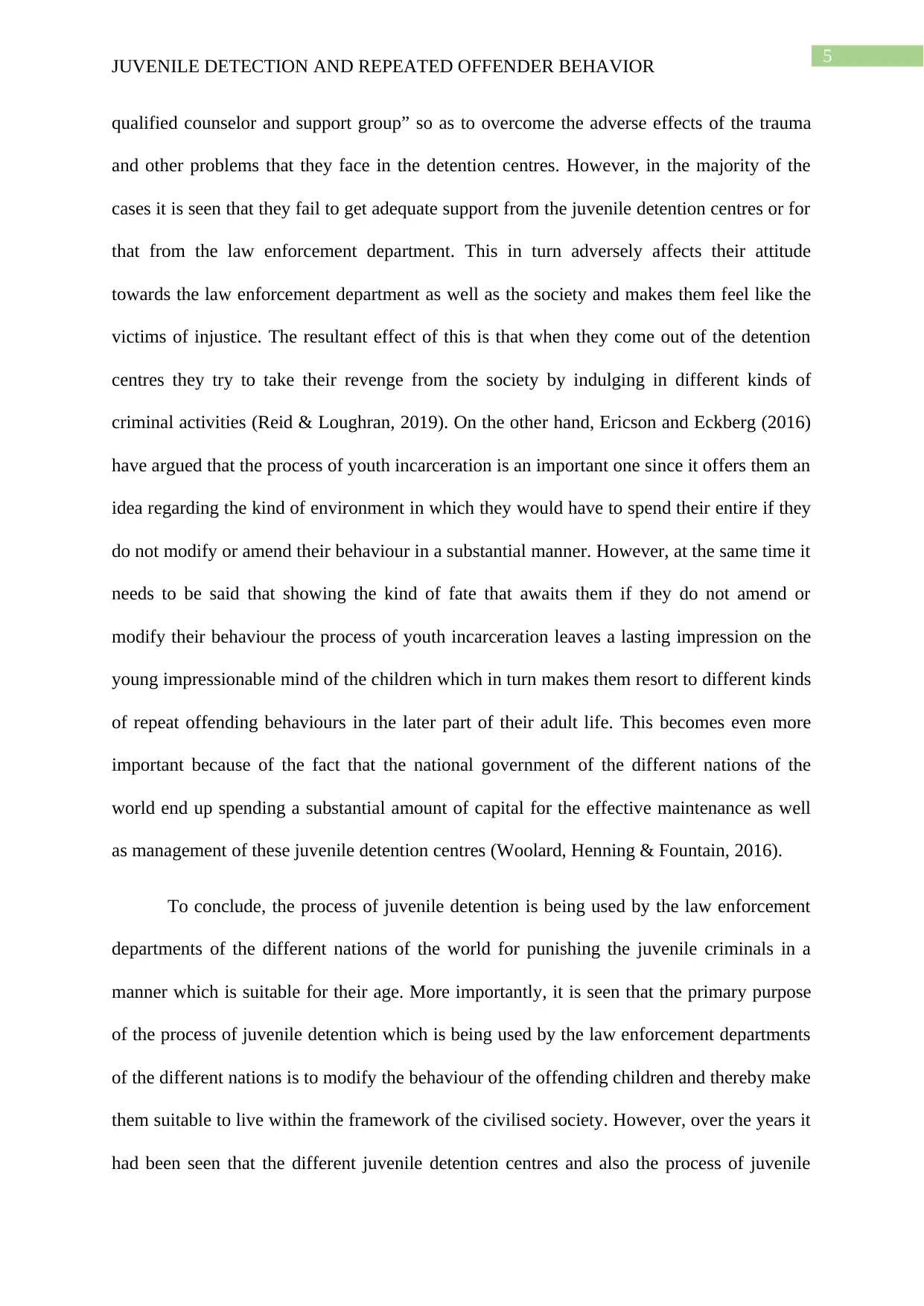
5
JUVENILE DETECTION AND REPEATED OFFENDER BEHAVIOR
qualified counselor and support group” so as to overcome the adverse effects of the trauma
and other problems that they face in the detention centres. However, in the majority of the
cases it is seen that they fail to get adequate support from the juvenile detention centres or for
that from the law enforcement department. This in turn adversely affects their attitude
towards the law enforcement department as well as the society and makes them feel like the
victims of injustice. The resultant effect of this is that when they come out of the detention
centres they try to take their revenge from the society by indulging in different kinds of
criminal activities (Reid & Loughran, 2019). On the other hand, Ericson and Eckberg (2016)
have argued that the process of youth incarceration is an important one since it offers them an
idea regarding the kind of environment in which they would have to spend their entire if they
do not modify or amend their behaviour in a substantial manner. However, at the same time it
needs to be said that showing the kind of fate that awaits them if they do not amend or
modify their behaviour the process of youth incarceration leaves a lasting impression on the
young impressionable mind of the children which in turn makes them resort to different kinds
of repeat offending behaviours in the later part of their adult life. This becomes even more
important because of the fact that the national government of the different nations of the
world end up spending a substantial amount of capital for the effective maintenance as well
as management of these juvenile detention centres (Woolard, Henning & Fountain, 2016).
To conclude, the process of juvenile detention is being used by the law enforcement
departments of the different nations of the world for punishing the juvenile criminals in a
manner which is suitable for their age. More importantly, it is seen that the primary purpose
of the process of juvenile detention which is being used by the law enforcement departments
of the different nations is to modify the behaviour of the offending children and thereby make
them suitable to live within the framework of the civilised society. However, over the years it
had been seen that the different juvenile detention centres and also the process of juvenile
JUVENILE DETECTION AND REPEATED OFFENDER BEHAVIOR
qualified counselor and support group” so as to overcome the adverse effects of the trauma
and other problems that they face in the detention centres. However, in the majority of the
cases it is seen that they fail to get adequate support from the juvenile detention centres or for
that from the law enforcement department. This in turn adversely affects their attitude
towards the law enforcement department as well as the society and makes them feel like the
victims of injustice. The resultant effect of this is that when they come out of the detention
centres they try to take their revenge from the society by indulging in different kinds of
criminal activities (Reid & Loughran, 2019). On the other hand, Ericson and Eckberg (2016)
have argued that the process of youth incarceration is an important one since it offers them an
idea regarding the kind of environment in which they would have to spend their entire if they
do not modify or amend their behaviour in a substantial manner. However, at the same time it
needs to be said that showing the kind of fate that awaits them if they do not amend or
modify their behaviour the process of youth incarceration leaves a lasting impression on the
young impressionable mind of the children which in turn makes them resort to different kinds
of repeat offending behaviours in the later part of their adult life. This becomes even more
important because of the fact that the national government of the different nations of the
world end up spending a substantial amount of capital for the effective maintenance as well
as management of these juvenile detention centres (Woolard, Henning & Fountain, 2016).
To conclude, the process of juvenile detention is being used by the law enforcement
departments of the different nations of the world for punishing the juvenile criminals in a
manner which is suitable for their age. More importantly, it is seen that the primary purpose
of the process of juvenile detention which is being used by the law enforcement departments
of the different nations is to modify the behaviour of the offending children and thereby make
them suitable to live within the framework of the civilised society. However, over the years it
had been seen that the different juvenile detention centres and also the process of juvenile
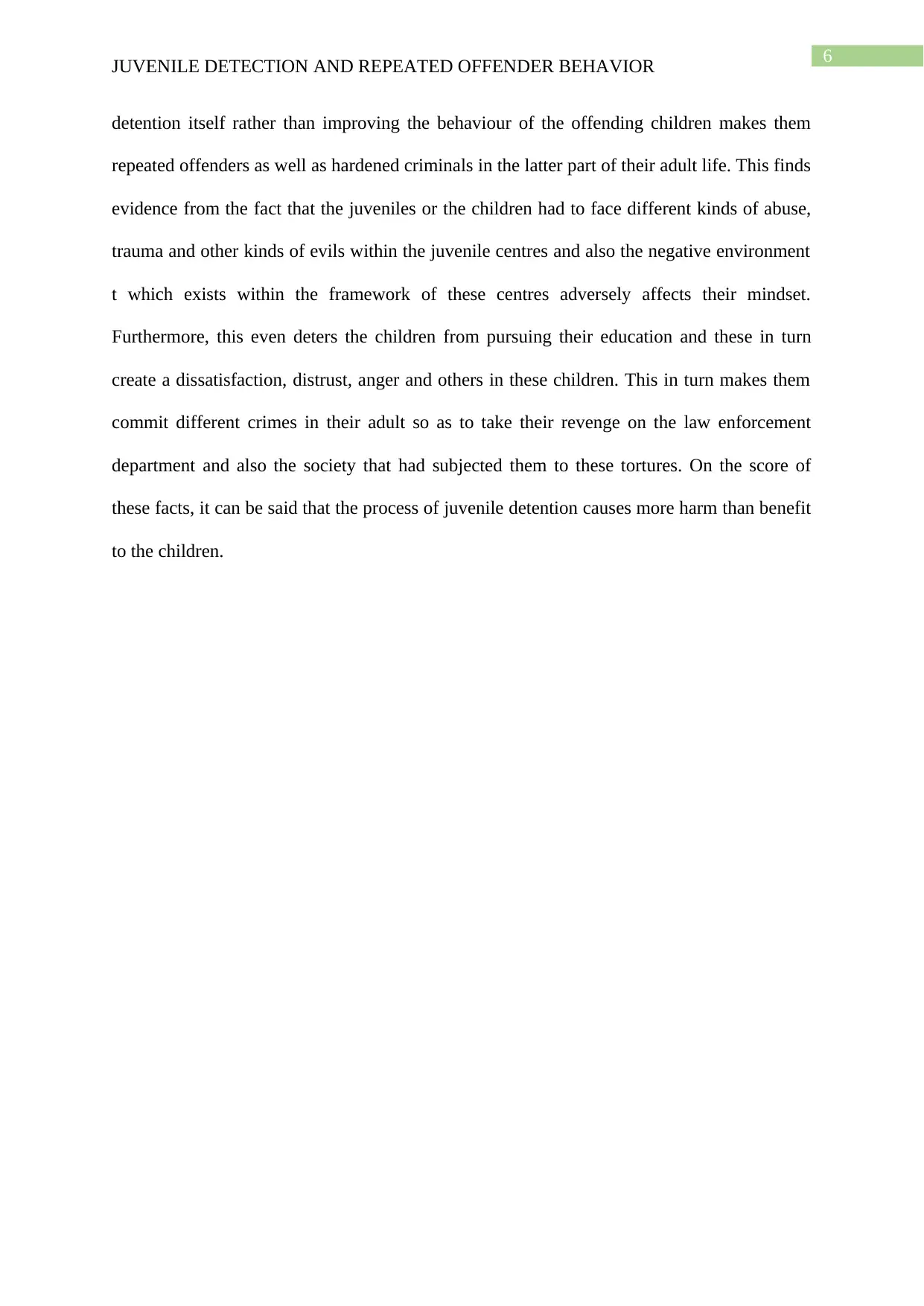
6
JUVENILE DETECTION AND REPEATED OFFENDER BEHAVIOR
detention itself rather than improving the behaviour of the offending children makes them
repeated offenders as well as hardened criminals in the latter part of their adult life. This finds
evidence from the fact that the juveniles or the children had to face different kinds of abuse,
trauma and other kinds of evils within the juvenile centres and also the negative environment
t which exists within the framework of these centres adversely affects their mindset.
Furthermore, this even deters the children from pursuing their education and these in turn
create a dissatisfaction, distrust, anger and others in these children. This in turn makes them
commit different crimes in their adult so as to take their revenge on the law enforcement
department and also the society that had subjected them to these tortures. On the score of
these facts, it can be said that the process of juvenile detention causes more harm than benefit
to the children.
JUVENILE DETECTION AND REPEATED OFFENDER BEHAVIOR
detention itself rather than improving the behaviour of the offending children makes them
repeated offenders as well as hardened criminals in the latter part of their adult life. This finds
evidence from the fact that the juveniles or the children had to face different kinds of abuse,
trauma and other kinds of evils within the juvenile centres and also the negative environment
t which exists within the framework of these centres adversely affects their mindset.
Furthermore, this even deters the children from pursuing their education and these in turn
create a dissatisfaction, distrust, anger and others in these children. This in turn makes them
commit different crimes in their adult so as to take their revenge on the law enforcement
department and also the society that had subjected them to these tortures. On the score of
these facts, it can be said that the process of juvenile detention causes more harm than benefit
to the children.
Paraphrase This Document
Need a fresh take? Get an instant paraphrase of this document with our AI Paraphraser
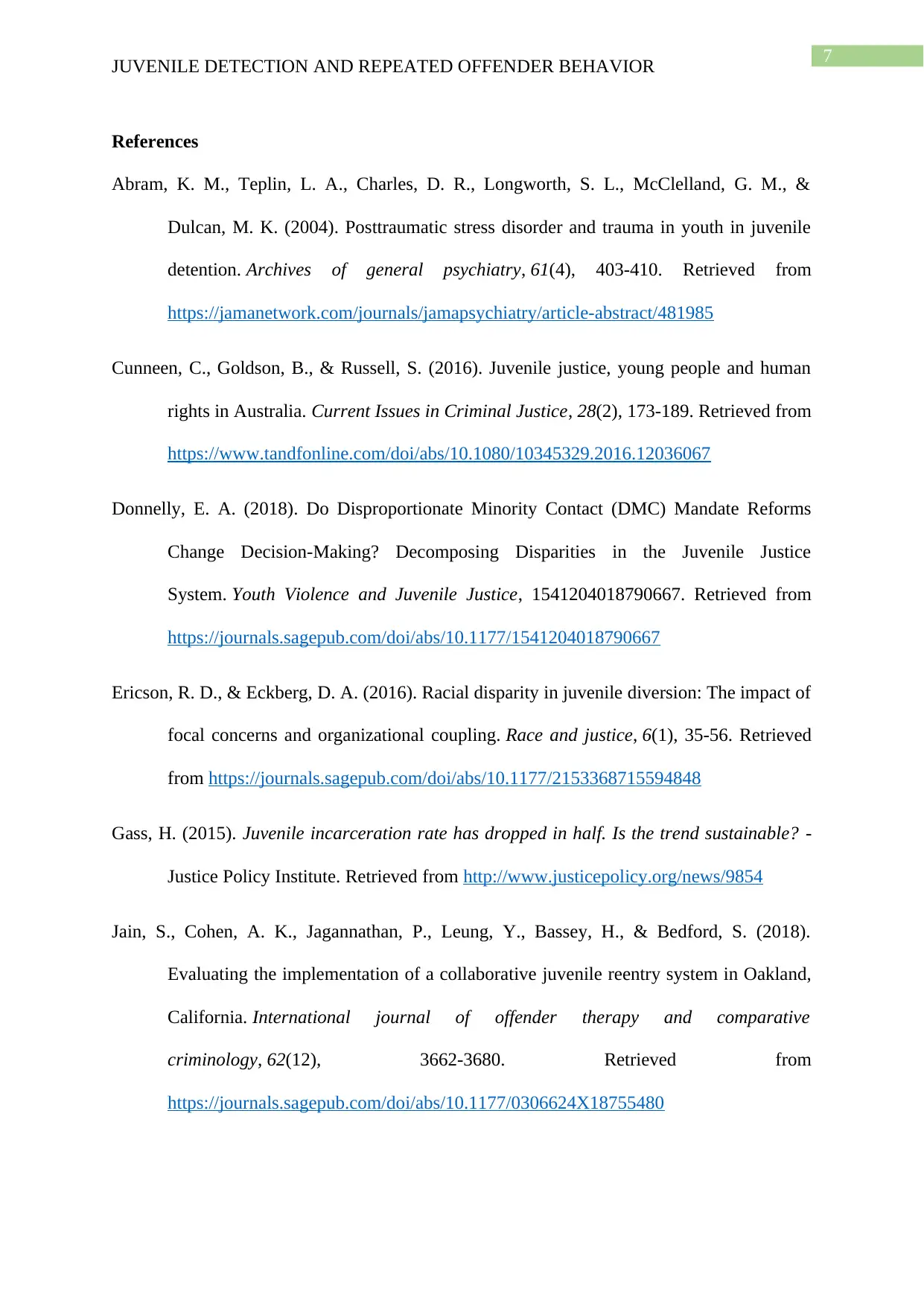
7
JUVENILE DETECTION AND REPEATED OFFENDER BEHAVIOR
References
Abram, K. M., Teplin, L. A., Charles, D. R., Longworth, S. L., McClelland, G. M., &
Dulcan, M. K. (2004). Posttraumatic stress disorder and trauma in youth in juvenile
detention. Archives of general psychiatry, 61(4), 403-410. Retrieved from
https://jamanetwork.com/journals/jamapsychiatry/article-abstract/481985
Cunneen, C., Goldson, B., & Russell, S. (2016). Juvenile justice, young people and human
rights in Australia. Current Issues in Criminal Justice, 28(2), 173-189. Retrieved from
https://www.tandfonline.com/doi/abs/10.1080/10345329.2016.12036067
Donnelly, E. A. (2018). Do Disproportionate Minority Contact (DMC) Mandate Reforms
Change Decision-Making? Decomposing Disparities in the Juvenile Justice
System. Youth Violence and Juvenile Justice, 1541204018790667. Retrieved from
https://journals.sagepub.com/doi/abs/10.1177/1541204018790667
Ericson, R. D., & Eckberg, D. A. (2016). Racial disparity in juvenile diversion: The impact of
focal concerns and organizational coupling. Race and justice, 6(1), 35-56. Retrieved
from https://journals.sagepub.com/doi/abs/10.1177/2153368715594848
Gass, H. (2015). Juvenile incarceration rate has dropped in half. Is the trend sustainable? -
Justice Policy Institute. Retrieved from http://www.justicepolicy.org/news/9854
Jain, S., Cohen, A. K., Jagannathan, P., Leung, Y., Bassey, H., & Bedford, S. (2018).
Evaluating the implementation of a collaborative juvenile reentry system in Oakland,
California. International journal of offender therapy and comparative
criminology, 62(12), 3662-3680. Retrieved from
https://journals.sagepub.com/doi/abs/10.1177/0306624X18755480
JUVENILE DETECTION AND REPEATED OFFENDER BEHAVIOR
References
Abram, K. M., Teplin, L. A., Charles, D. R., Longworth, S. L., McClelland, G. M., &
Dulcan, M. K. (2004). Posttraumatic stress disorder and trauma in youth in juvenile
detention. Archives of general psychiatry, 61(4), 403-410. Retrieved from
https://jamanetwork.com/journals/jamapsychiatry/article-abstract/481985
Cunneen, C., Goldson, B., & Russell, S. (2016). Juvenile justice, young people and human
rights in Australia. Current Issues in Criminal Justice, 28(2), 173-189. Retrieved from
https://www.tandfonline.com/doi/abs/10.1080/10345329.2016.12036067
Donnelly, E. A. (2018). Do Disproportionate Minority Contact (DMC) Mandate Reforms
Change Decision-Making? Decomposing Disparities in the Juvenile Justice
System. Youth Violence and Juvenile Justice, 1541204018790667. Retrieved from
https://journals.sagepub.com/doi/abs/10.1177/1541204018790667
Ericson, R. D., & Eckberg, D. A. (2016). Racial disparity in juvenile diversion: The impact of
focal concerns and organizational coupling. Race and justice, 6(1), 35-56. Retrieved
from https://journals.sagepub.com/doi/abs/10.1177/2153368715594848
Gass, H. (2015). Juvenile incarceration rate has dropped in half. Is the trend sustainable? -
Justice Policy Institute. Retrieved from http://www.justicepolicy.org/news/9854
Jain, S., Cohen, A. K., Jagannathan, P., Leung, Y., Bassey, H., & Bedford, S. (2018).
Evaluating the implementation of a collaborative juvenile reentry system in Oakland,
California. International journal of offender therapy and comparative
criminology, 62(12), 3662-3680. Retrieved from
https://journals.sagepub.com/doi/abs/10.1177/0306624X18755480
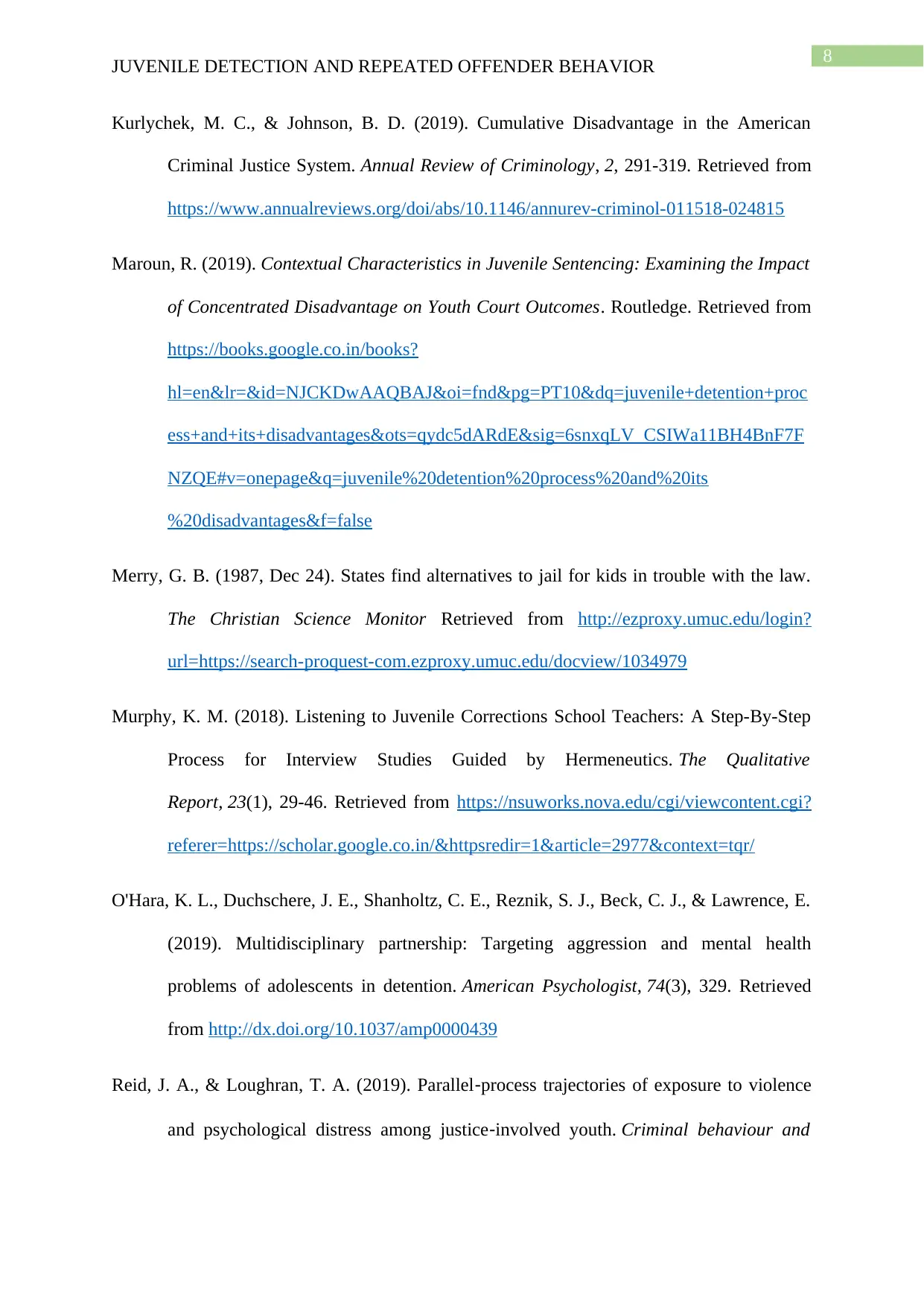
8
JUVENILE DETECTION AND REPEATED OFFENDER BEHAVIOR
Kurlychek, M. C., & Johnson, B. D. (2019). Cumulative Disadvantage in the American
Criminal Justice System. Annual Review of Criminology, 2, 291-319. Retrieved from
https://www.annualreviews.org/doi/abs/10.1146/annurev-criminol-011518-024815
Maroun, R. (2019). Contextual Characteristics in Juvenile Sentencing: Examining the Impact
of Concentrated Disadvantage on Youth Court Outcomes. Routledge. Retrieved from
https://books.google.co.in/books?
hl=en&lr=&id=NJCKDwAAQBAJ&oi=fnd&pg=PT10&dq=juvenile+detention+proc
ess+and+its+disadvantages&ots=qydc5dARdE&sig=6snxqLV_CSIWa11BH4BnF7F
NZQE#v=onepage&q=juvenile%20detention%20process%20and%20its
%20disadvantages&f=false
Merry, G. B. (1987, Dec 24). States find alternatives to jail for kids in trouble with the law.
The Christian Science Monitor Retrieved from http://ezproxy.umuc.edu/login?
url=https://search-proquest-com.ezproxy.umuc.edu/docview/1034979
Murphy, K. M. (2018). Listening to Juvenile Corrections School Teachers: A Step-By-Step
Process for Interview Studies Guided by Hermeneutics. The Qualitative
Report, 23(1), 29-46. Retrieved from https://nsuworks.nova.edu/cgi/viewcontent.cgi?
referer=https://scholar.google.co.in/&httpsredir=1&article=2977&context=tqr/
O'Hara, K. L., Duchschere, J. E., Shanholtz, C. E., Reznik, S. J., Beck, C. J., & Lawrence, E.
(2019). Multidisciplinary partnership: Targeting aggression and mental health
problems of adolescents in detention. American Psychologist, 74(3), 329. Retrieved
from http://dx.doi.org/10.1037/amp0000439
Reid, J. A., & Loughran, T. A. (2019). Parallel‐process trajectories of exposure to violence
and psychological distress among justice‐involved youth. Criminal behaviour and
JUVENILE DETECTION AND REPEATED OFFENDER BEHAVIOR
Kurlychek, M. C., & Johnson, B. D. (2019). Cumulative Disadvantage in the American
Criminal Justice System. Annual Review of Criminology, 2, 291-319. Retrieved from
https://www.annualreviews.org/doi/abs/10.1146/annurev-criminol-011518-024815
Maroun, R. (2019). Contextual Characteristics in Juvenile Sentencing: Examining the Impact
of Concentrated Disadvantage on Youth Court Outcomes. Routledge. Retrieved from
https://books.google.co.in/books?
hl=en&lr=&id=NJCKDwAAQBAJ&oi=fnd&pg=PT10&dq=juvenile+detention+proc
ess+and+its+disadvantages&ots=qydc5dARdE&sig=6snxqLV_CSIWa11BH4BnF7F
NZQE#v=onepage&q=juvenile%20detention%20process%20and%20its
%20disadvantages&f=false
Merry, G. B. (1987, Dec 24). States find alternatives to jail for kids in trouble with the law.
The Christian Science Monitor Retrieved from http://ezproxy.umuc.edu/login?
url=https://search-proquest-com.ezproxy.umuc.edu/docview/1034979
Murphy, K. M. (2018). Listening to Juvenile Corrections School Teachers: A Step-By-Step
Process for Interview Studies Guided by Hermeneutics. The Qualitative
Report, 23(1), 29-46. Retrieved from https://nsuworks.nova.edu/cgi/viewcontent.cgi?
referer=https://scholar.google.co.in/&httpsredir=1&article=2977&context=tqr/
O'Hara, K. L., Duchschere, J. E., Shanholtz, C. E., Reznik, S. J., Beck, C. J., & Lawrence, E.
(2019). Multidisciplinary partnership: Targeting aggression and mental health
problems of adolescents in detention. American Psychologist, 74(3), 329. Retrieved
from http://dx.doi.org/10.1037/amp0000439
Reid, J. A., & Loughran, T. A. (2019). Parallel‐process trajectories of exposure to violence
and psychological distress among justice‐involved youth. Criminal behaviour and
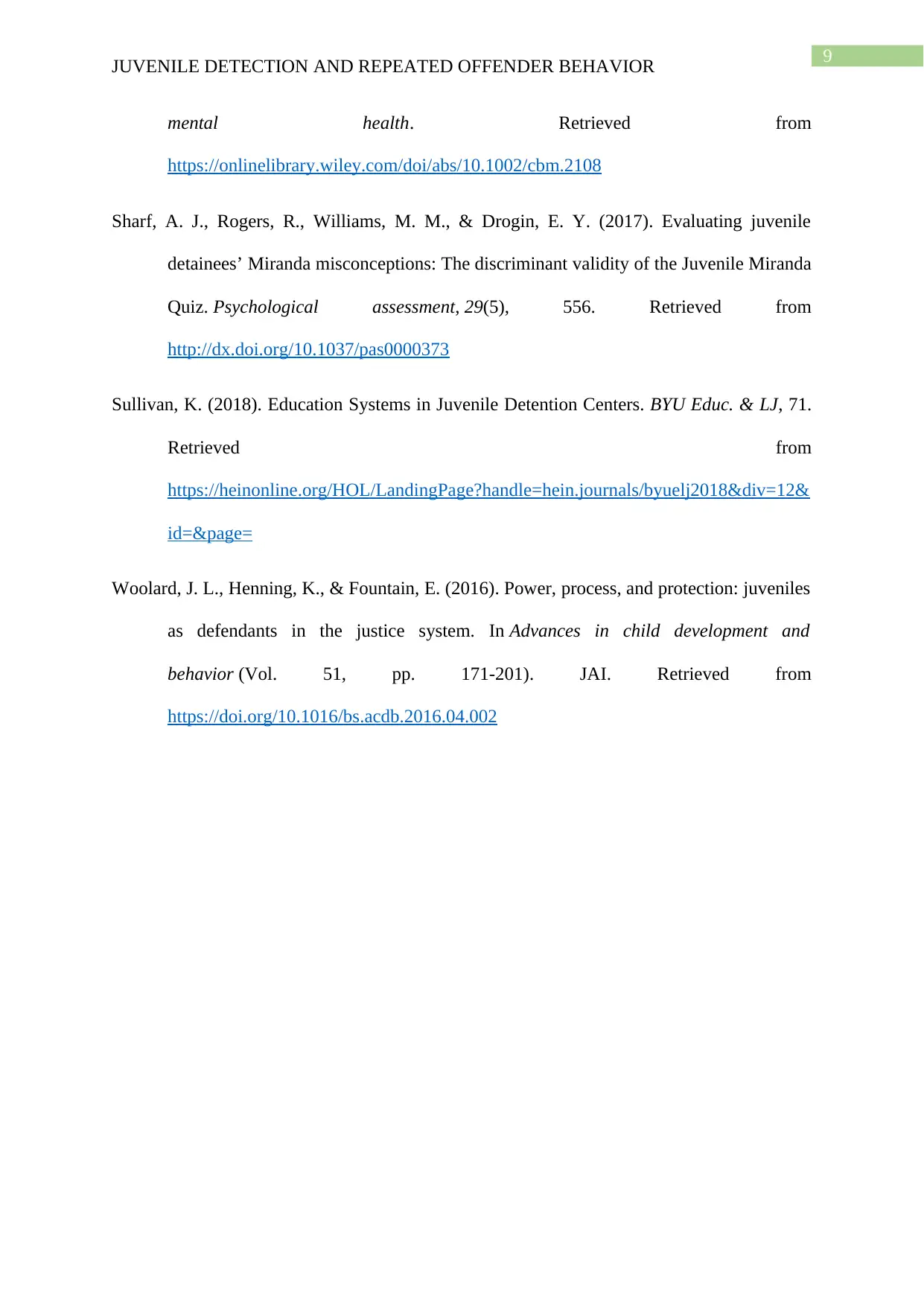
9
JUVENILE DETECTION AND REPEATED OFFENDER BEHAVIOR
mental health. Retrieved from
https://onlinelibrary.wiley.com/doi/abs/10.1002/cbm.2108
Sharf, A. J., Rogers, R., Williams, M. M., & Drogin, E. Y. (2017). Evaluating juvenile
detainees’ Miranda misconceptions: The discriminant validity of the Juvenile Miranda
Quiz. Psychological assessment, 29(5), 556. Retrieved from
http://dx.doi.org/10.1037/pas0000373
Sullivan, K. (2018). Education Systems in Juvenile Detention Centers. BYU Educ. & LJ, 71.
Retrieved from
https://heinonline.org/HOL/LandingPage?handle=hein.journals/byuelj2018&div=12&
id=&page=
Woolard, J. L., Henning, K., & Fountain, E. (2016). Power, process, and protection: juveniles
as defendants in the justice system. In Advances in child development and
behavior (Vol. 51, pp. 171-201). JAI. Retrieved from
https://doi.org/10.1016/bs.acdb.2016.04.002
JUVENILE DETECTION AND REPEATED OFFENDER BEHAVIOR
mental health. Retrieved from
https://onlinelibrary.wiley.com/doi/abs/10.1002/cbm.2108
Sharf, A. J., Rogers, R., Williams, M. M., & Drogin, E. Y. (2017). Evaluating juvenile
detainees’ Miranda misconceptions: The discriminant validity of the Juvenile Miranda
Quiz. Psychological assessment, 29(5), 556. Retrieved from
http://dx.doi.org/10.1037/pas0000373
Sullivan, K. (2018). Education Systems in Juvenile Detention Centers. BYU Educ. & LJ, 71.
Retrieved from
https://heinonline.org/HOL/LandingPage?handle=hein.journals/byuelj2018&div=12&
id=&page=
Woolard, J. L., Henning, K., & Fountain, E. (2016). Power, process, and protection: juveniles
as defendants in the justice system. In Advances in child development and
behavior (Vol. 51, pp. 171-201). JAI. Retrieved from
https://doi.org/10.1016/bs.acdb.2016.04.002
1 out of 10
Related Documents
Your All-in-One AI-Powered Toolkit for Academic Success.
+13062052269
info@desklib.com
Available 24*7 on WhatsApp / Email
![[object Object]](/_next/static/media/star-bottom.7253800d.svg)
Unlock your academic potential
© 2024 | Zucol Services PVT LTD | All rights reserved.
